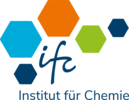Kontakt
Sprecher
Stellvertretender Sprecher
Beckhaus
C–H bond activation reactions in the coordination sphere of early transition metals
The general problem of activating strong and inert C–H bonds of hydrocarbons by transition metal complexes is still a great challenge in organometallic chemistry. Intermolecular processes, which leads to alkylidene M=CR2 or alkylidyne M≡CR derivatives, starting from σ-alkyl metal complexes are well developed. Our group is interested in intermolecular C–H bond activation reactions. Knowledge of C–H bond activation and elimination reactions in the coordination spheres of early transition metals contributes considerably to the understanding of organometallic compounds. Whereas β-H containing metal alkyls reacts spontaneously to alkene complexes, analogous reactions of metal amides to metallaaziridines require normally significantly harsher reaction conditions. However, our group was able to show, that reactions of bis(η5:η1-pentafulvene)-titanium complexes with a broad range of secondary amines leads to titanaazirines by efficient N–H/C–H bond activation in quantitative yield under mild conditions (room temperature). The reactions sequence becomes understandable by the isolation and characterization of all reaction products and investigation by NMR and single crystal X-Ray diffraction methods. The formation of a broad range of subsequent products is also investigated. In the new project, these Element–H/C–H bond activation processes should be further developed, involving substrates, like further amines, alcohols, thiols, hydrocarbons and further pentafulvene complexes of group 4 and 5 metals. A very good knowledge in handling air and moisture sensitive compounds is expected.

